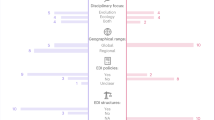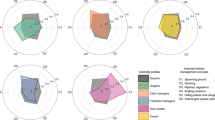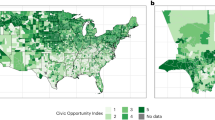Abstract
International scientific assessments are transnational knowledge-based expert networks with a mandate to advise policymakers. A well-known example is the Millennium Ecosystem Assessment (MA), which synthesized research on ecosystem services between 2001 and 2005, utilizing the knowledge of 1,360 expert members. Little, however, is known about the membership composition and the driving forces behind membership nominations in the MA and similar organizations. Here we introduce a survey data set on recruitment in the MA and analyse nomination patterns among experts as a complex network. The results indicate that membership recruitment was governed by prior contacts in other transnational elite organizations and a range of other factors related to personal affinity. Network analysis demonstrates how some core individuals were particularly influential in shaping the overall membership composition of the group. These findings add to recently noted concerns about the lack of diversity of views represented in international scientific assessments.
This is a preview of subscription content, access via your institution
Access options
Access Nature and 54 other Nature Portfolio journals
Get Nature+, our best-value online-access subscription
$29.99 / 30 days
cancel any time
Subscribe to this journal
Receive 12 print issues and online access
$209.00 per year
only $17.42 per issue
Buy this article
- Purchase on Springer Link
- Instant access to full article PDF
Prices may be subject to local taxes which are calculated during checkout




Similar content being viewed by others
References
Selin, H. & Eckley, N. Science, politics, and persistent organic pollutants: the role of scientific assessments in international environmental co-operation. Int. Environ. Agreements Polit. Law Econ. 3, 17–42 (2003).
Haas, P. M. Introduction: epistemic communities and international policy coordination. Int. Organ. 46, 1–35 (1992).
Ostrom, E. Polycentric systems for coping with collective action and global environmental change. Glob. Environ. Change 20, 550–557 (2010).
Dingwerth, K. & Pattberg, P. Global governance as a perspective on world politics. Glob. Governance 12, 185–203 (2006).
Keohane, R. O., Nye, J. & Joseph, S. Power and interdependence in the information age. Foreign Aff. 77, 81–94 (1998).
Demeritt, D. The construction of global warming and the politics of science. Ann. Assoc. Am. Geograph. 91, 307–337 (2001).
Allan, B. B. Producing the climate: states, scientists, and the constitution of global governance objects. Int. Organ. 71, 131–162 (2017).
Adler, C. E. & Hirsch Hadorn, G. The IPCC and treatment of uncertainties: topics and sources of dissensus. Wiley Interdisciplinary Rev. Clim. Change 5, 663–676 (2014).
Sebenius, J. K. Challenging conventional explanations of international cooperation: negotiation analysis and the case of epistemic communities. Int. Organ. 46, 323–365 (1992).
Vähämaa, M. Groups as epistemic communities: social forces and affect as antecedents to knowledge. Soc. Epistemol. 27, 3–20 (2013).
Carpenter, S. R. et al. Science for managing ecosystem services: beyond the Millennium Ecosystem Assessment. Proc. Natl Acad. Sci. USA 106, 1305–1312 (2009).
Guerry, A. D. et al. Natural capital and ecosystem services informing decisions: from promise to practice. Proc. Natl Acad. Sci. USA 112, 7348–7355 (2015).
Larigauderie, A. & Mooney, H. A. The Intergovernmental Science–Policy Platform on Biodiversity and Ecosystem Services: moving a step closer to an IPCC-like mechanism for biodiversity. Curr. Opin. Environ. Sustainability 2, 9–14 (2010).
Mooney, H. A., Duraiappah, A. & Larigauderie, A. Evolution of natural and social science interactions in global change research programs. Proc. Natl Acad. Sci. USA 110, 3665–3672 (2013).
Steffen, W. Interdisciplinary research for managing ecosystem services. Proc. Natl Acad. Sci. USA 106, 1301–1302 (2009).
Tallis, H., Kareiva, P., Marvier, M. & Chang, A. An ecosystem services framework to support both practical conservation and economic development. Proc. Natl Acad. Sci. USA 105, 9457–9464 (2008).
Corbera, E., Calvet-Mir, L., Hughes, H. & Paterson, M. Patterns of authorship in the IPCC Working Group III report. Nat. Clim. Change 6, 94–99 (2016).
Loreau, M. et al. Diversity without representation. Nature 442, 245–246 (2006).
Beck, S. et al. Towards a reflexive turn in the governance of global environmental expertise. the cases of the IPCC and the IPBES. GAIA – Ecol. Perspect. Sci. Soc. 23, 80–87 (2014).
IPCC How Does the IPCC Work? (2017); http://www.ipcc.ch/organization/organization_structure.shtml.
Hansen, J. E. Scientific reticence and sea level rise. Environ. Res. Lett. 2, 024002 (2007).
Hulme, M. & Mahony, M. Climate change: what do we know about the IPCC? Prog. Phys. Geogr. 34, 705–718 (2010).
Jasanoff, S. States of Knowledge: The Co-production of Science and the Social Order (Routledge, 2004).
Mitchell, R. B., Clark, W. C., Cash, D. W. & Dickson, N. M. Global Environmental Assessments: Information and Influence (MIT Press, 2006).
Davis Cross, M. K. Rethinking epistemic communities twenty years later. Rev. Int. Stud. 39, 137–160 (2013).
Stone, D. Global public policy, transnational policy communities, and their networks. Policy Stud. J. 36, 19–38 (2008).
Richardson, I. N., Kakabadse, A. P. & Kakabadse, N. K. Shaping global political realities: the workings of transnational elite networks. World Financ. Rev. March–April, 32–35 (2012).
Minas, S. The Rise of Transnational Networks in Climate Change Governance: A Study in Hybridity. Transnational Law Institute Think! Paper 5/2015 (Dickson Poon Transnational Law Institute, King’s College London, 2015).
Keohane, R. O., Nye, J. & Joseph, S. in Efficiency, Equity, and Legitimacy: The Multilateral Trading System at the Millennium (eds Porter, R. B., Sauve, P., Subramanian, A. & Beviglia Zampetti, A.) (Brookings Institution Press, 2001).
Slaughter, A.-M. The accountability of government networks. Indiana J. Glob. Legal Stud. 8, 347–367 (2001).
Kaiser, K. Transnational relations as a threat to the democratic process. Int. Organ. 25, 706–720 (1971).
McDonnell, D. & Valbruzzi, M. Defining and classifying technocrat-led and technocratic governments. Eur. J. Polit. Res. 53, 654–671 (2014).
Jasny, L., Waggle, J. & Fisher, D. R. An empirical examination of echo chambers in US climate policy networks. Nat. Clim. Change 5, 782–786 (2015).
Fruchterman, T. M. J. & Reingold, E. M. Graph drawing by force-directed placement. Softw. Pract. Exper. 21, 1129–1164 (1991).
Cranmer, S. J., Leifeld, P., McClurg, S. D. & Rolfe, M. Navigating the range of statistical tools for inferential network analysis. Am. J. Polit. Sci. 61, 237–251 (2017).
Ward, M. D., Stovel, K. & Sacks, A. Network analysis and political science. Annu. Rev. Polit. Sci. 14, 245–264 (2011).
Butts, C. T. network: a package for managing relational data in R. J. Stat. Softw. 24, 1–36 (2008).
Butts, C. T. Social network analysis with sna. J. Stat. Softw. 24, 1–51 (2008).
R Core Team R: A Language and Environment for Statistical Computing (R Foundation for Statistical Computing, 2015).
Hunter, D. R., Handcock, M. S., Butts, C. T., Goodreau, S. M. & Morris, M. ergm: a package to fit, simulate and diagnose exponential-family models for networks. J. Stat. Softw. 24, 1–29 (2008).
Leifeld, P., Cranmer, S. J. & Desmarais, B. A. Temporal exponential random graph models with btergm: Estimation and bootstrap confidence intervals. J. Stat. Softw. (in the press).
Leifeld, P. texreg: Conversion of statistical model output in R to LaTeX and HTML tables. J. Stat. Softw. 55, 1–24 (2013).
Acknowledgements
This project was funded, in part, by a grant from a 2004 Columbia University Faculty Development Grant and by the Swiss National Science Foundation (IZK0Z1_157912/1). Part of this work was carried out at the Swiss Federal Institute of Aquatic Science and Technology (Eawag) and at the University of Bern, Institute of Political Science. The authors wish to thank W. V. Reid and the MA Board for granting them access and allowing them to collect the survey data. The authors would also like to thank P.-B. McInerney and E. Fazekas for their research assistance during the early stages of this project.
Author information
Authors and Affiliations
Contributions
D.R.F. directed research design and data collection. P.L. was responsible for data analysis. P.L. and D.R.F. contributed to project design, write-up of findings, and revisions.
Corresponding author
Ethics declarations
Competing interests
The authors declare no competing financial interests.
Supplementary information
Supplementary Information
Supplementary Information (PDF 4930 kb)
Rights and permissions
About this article
Cite this article
Leifeld, P., Fisher, D. Membership nominations in international scientific assessments. Nature Clim Change 7, 730–735 (2017). https://doi.org/10.1038/nclimate3392
Received:
Accepted:
Published:
Issue Date:
DOI: https://doi.org/10.1038/nclimate3392



